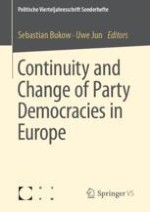2020 | OriginalPaper | Buchkapitel
The Origins of Party System Polarisation: How Parties and Voters Shape the Ideological Spread in Party Systems
verfasst von : Johannes Schmitt, Simon T. Franzmann
Erschienen in: Continuity and Change of Party Democracies in Europe
Verlag: Springer Fachmedien Wiesbaden
Aktivieren Sie unsere intelligente Suche, um passende Fachinhalte oder Patente zu finden.
Wählen Sie Textabschnitte aus um mit Künstlicher Intelligenz passenden Patente zu finden. powered by
Markieren Sie Textabschnitte, um KI-gestützt weitere passende Inhalte zu finden. powered by
